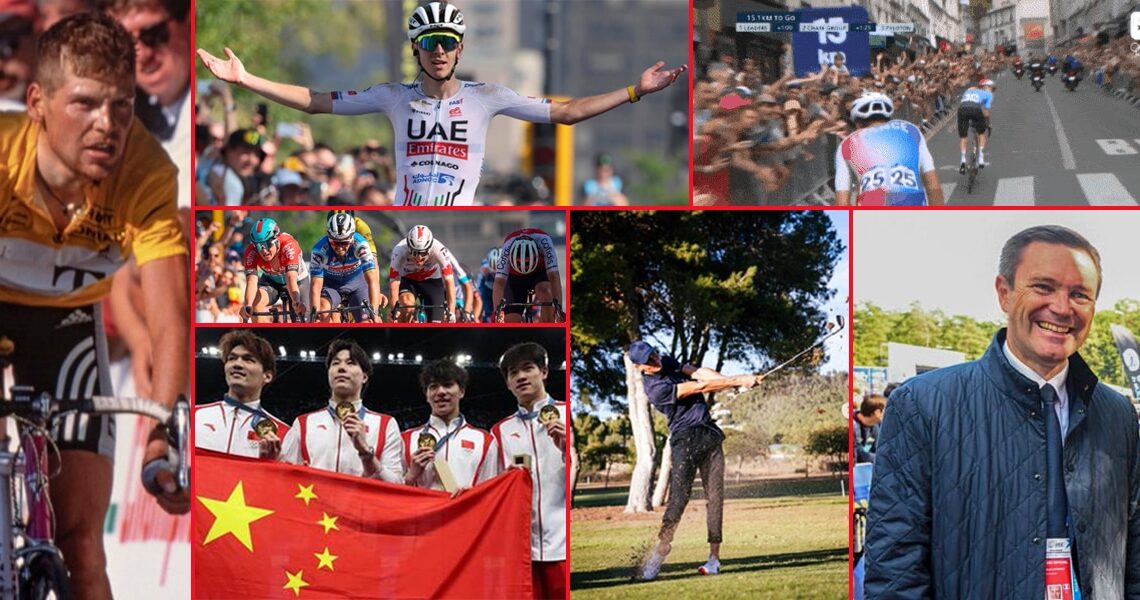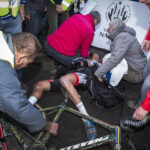In this week’s AIRmail newsletter, The Outer Line takes an in-depth look at: Lappartient’s bid for Olympic glory, Pog wrapping up remarkable season; changing race strategy; Saudi PIF activities; new Ullrich interview, new fuel on antidoping fire…
# Catch up on pro cycling – and its context within the broader world of sports – with AIRmail … Analysis, Insight and Reflections from The Outer Line. You can subscribe to AIRmail here, and check out The Outer Line’s extensive library of articles on the governance and economics of cycling here. #
Key Takeaways:
Lappartient’s Bid for Olympic Glory
Pogačar Wrapping Up Remarkable Season
The Importance of UCI Points, and How It May Be Changing Racing Strategy
Developments at PIF Don’t Seem to Include Pro Cycling
Ullrich Interview Adds Context to Cycling’s Past and Future
New Fuel Added to the Antidoping Fire
David Lappartient to be the next IOC President?
In a decision that could potentially have a major impact on pro cycling, the International Olympic Committee this week issued a letter to its 117 members laying out some ground rules for its upcoming election of a new president, now scheduled for early next year. According to the organization’s charter, neither of the early favorites, Sebastian Coe (widely considered to be the most qualified, but who has often been in conflict with out-going president Thomas Bach) nor Juan Antonio Samaranch Jr. (whose father led the organization for over two decades) would technically be eligible to run – due to age or tenure considerations. The letter, from IOC ethics commission chairman and former United Nations Secretary-General Ban-Ki Moon suggested that special exemptions would have to be made in order for either to serve. At first glance, this might improve the odds for other likely candidates, including Kirsty Coventry, the sports minister of Zimbabwe, and cycling’s own politically ambitious David Lappartient – both of whom seem to have the tacit support of Bach. However, the letter also suggested a conflict of interest in holding two different presidential roles, a consideration which could potentially complicate Lappartient’s nascent bid. The election process is certainly one of the least transparent and political in all of sport, with one report saying that the letter “added to the complexity of an election that is one of the quirkiest in world sports. Candidates cannot publish campaign videos, nor organize public meetings or take part in public debates.” If he is actually able to mount a credible campaign in this murky process, Lappartient could obviously resign his cycling position, if necessary, at any point. Insiders say Lappartient’s ally UCI Vice President and Management Committee member Enrico Della Casa is already positioned to step up should Lappartient decide to bail out before the end of his elected term. We will monitor this situation closely over the coming months.
Tadej Pogačar favorite for the Zurich World Championships?
With pro cycling building towards its conclusion in the coming few weeks, Tadej Pogačar signaled, unsurprisingly, that he should be considered the favorite to win the upcoming Zurich World Championships, by riding clear of the field at Sunday’s Montreal’s Grand Prix – picking up his 22nd win of the 2024 season. If this outcome and performance inspires a vague feeling of deja vu, it’s because Pogačar riding clear at the end of a hilly WorldTour one-day race is becoming almost a forgone conclusion. Over the last two years, Pogačar has captured seven out of the 12 WorldTour one-day races he has finished, winning with long-range solo attacks on six out of those seven victories. Highlighting this near-unprecedented inevitability, in the five WorldTour one-day races Pogačar didn’t win, he finished on the podium three times and inside the top seven on all occasions. And, with 22 (and counting) victories so far this year, Pogačar has nearly 50% of Wout van Aert’s entire career win total in just this season. If it wasn’t clear before, with Pogačar knocking on the door of becoming only the third rider of all-time to win the triple crown (Giro, Tour, and World Championships), it is becoming pretty obvious that amongst cycling’s Big Six (Vingegaard, Van der Poel, Van Aert, Roglič and Evenepoel) Pogačar stands head and shoulders above the rest.
The long range attack from Evenepoel in Paris
And it’s not just Pogačar riding clear to take victory; it is “the new normal” across the Big Six and racing in general. Eight of the last nine one-day Monuments were won by Pogačar, Van der Poel or Evenepoel via solo attack, which suggests that – just like in the rest of the sporting world – new data and innovative “question everything” strategies have drastically changed how the game is played. Athletes, coaches and management are constantly reexamining approach and tactics, and pro cycling is no different. While the top riders, including Van der Poel and Pogačar, used to race more conservatively and win after outsprinting or outfoxing small groups at the finish line, the last few seasons have seen them throw out the old playbook. Now, they exploit their strong teams to strip their key rivals of teammates early on and then attack from extremely far out; this allows them to leverage their superior strength to hold off the weaker chasers, who are not able to fully commit due to being isolated in a group of rivals. This basic tactic may seem obvious, but until very recently, favorites didn’t dare attack first since it was assumed that they wouldn’t be able to sustain a high pace for a long period of time – that they would eventually be caught and dropped by the chasers. But, with the advent of extremely high carbohydrate fueling techniques and the simple realization that a group of weaker riders may not be able to ride as fast as a solo stronger rider, it is now perhaps the safest bet for the major favorites is to get way ahead in the race before tactical battles with lesser rivals can complicate the finale.
Lotto-Dsnty’s Maxim van Gils 4th in Montréal – More UCI points
One component of this shift to a “solo winner takes all” culture is over-reliance on a consistent stream of critical UCI points for the WorldTour promotion/relegation system, which is a key for sponsorship value in the sport’s ecosystem. In short, chasing riders may be more concerned about maintaining a position in the chasing group rather than in actually chasing down the leader. For example, Lotto-Dsnty’s Maxim van Gils, who finished 4th on Sunday in Montréal, netted a valuable 275 UCI points for his second-division team that is looking to get back into the WorldTour when the current promotion/relegation cycle ends after the 2025 season; one could certainly argue that this hefty consolation prize was an incentive to maximize his finishing position in the chase group instead of reeling in Pogačar. However, any type of ranking and merit-based system seems likely to create at least some of these unintended incentives (another example is relegation-threatened English Premier League clubs playing to salvage a single point from a draw instead of going for the win). If it was truly as simple as the UCI points system suppressing chasers, wouldn’t a rider like Van Gils simply attack first and leverage the tactics stalemate to ride clear for the win? That we don’t see a “race within the race” to be the first rider to attack suggests the UCI’s promotion/relegation system isn’t killing racing, but rather we are simply in an age where a handful of riders are far and away better than the rest of the field.
Not great coverage of the Euro champs, Québec and Montréal
As an aside, the Grand Prix Cycliste de Montreal may have produced a worthy winner, but broadcast delivery gaffes confused cycling’s fans in many regions. Some fans were treated to a minutes-long aerial pan loop of Montreal’s landmarks while the race was on, and rather than wait for the feed to reconnect to watch the race on the subscription platform they’d paid for, they could have just navigated to YouTube to watch it for free on an unofficial feed ‒ again. Meanwhile, the EU Championships apparently had a solid production team but again lacked meaningful broadcast distribution, and other than another “unofficial” feed, most fans had to wait for the results to be posted on their favorite cycling web news or stats page, despite the high-quality action.
LIV Golf/PGA merger – MvdP
One storyline which has gone silent recently is the influential activity of the Saudi Arabian PIF in sports investments, including what is perceived to be a stalling out of the LIV Golf/PGA merger, investments in women’s tennis, and even the so-called “One Cycling” project. That’s not to say that there isn’t further activity by the PIF in sports ‒ in fact, a great many strategic moves are likely happening behind the scenes, including unofficial negotiations which apparently took place in New York City on the anniversary of 9/11. (The significance of the date ‒ and the alleged role Saudi Arabia played in the terrorist attacks ‒ was not missed by critics.) What has changed is the discretion surrounding the progress; an exposé presented by Play The Game and picked up by news carriers globally may have given the Saudi fund’s governors pause for concern regarding the scrutiny of their investments and objectives ‒ particularly the perception of sportswashing alleged human rights issues. There is every likelihood that the golf and tennis deals will be completed in the near future, and more sporting events like combat sports, Asian Winter Games, and soccer World Cup are to be hosted at Saudi venues. But given that we are almost through another UCI pro road season with essentially no new developments, one wonders if One Cycling – hyped as virtually inevitable just a year ago – has any place in PIF’s plans, or if any of the rumored venture capital partners are still interested in bringing the much-discussed project to fruition?
Jan Ullrich – ‘The sponsors knew’
While we try not to dwell on cycling’s past doping transgressions, one story from last week which bears further discussion is Jan Ullrich’s latest interview on German TV, in which he described the depth of his involvement with the competitive context of the era. A remarkable quote which has made the rounds is Ullrich’s assessment that, “People have to understand that doping was systemic. The sponsors knew everything. I was well paid, although I wouldn’t call it silence. It was a mutual agreement not to talk about it.” What is more remarkable is that many of the same pressures to use performance enhancing drugs and banned techniques are still present in modern pro cycling. Whereas Ullrich’s era was laid bare over time – the “death by a thousand cuts” of omerta confessions and improvements in testing detection calibration – many anti-doping activists believe that the modern era is standing on its own landmine, which could go off at any time if further improvements to detection technology, surveillance methods, anti-doping policy, and the competency of officials within the WADA and NADO ecosystem intersect to upend the status quo. As if on cue, just days later, German NADO officials announced a major PED distribution ring bust in Hanover.
Chinese men’s 4 x 100m medley relay in Paris 2024 Olympic Games (Photo: China News Service/Fu Tian)
And on that note, we had hoped that the WADA/USADA anti-doping war would have turned the corner towards peace since we last visited the conflagration, but more fuel was thrown on the fire when a complete copy of the “independent” report exonerating WADA’s actions came to light last week. The report’s author (a Swiss prosecutor retained by WADA) all-but parroted the main talking points from the April revelation of pervasive doping in the Chinese swimming program: that the positive tests were due to “kitchen” contamination, and that the processes followed were valid. However, given what we know now from the German TV documentary and its follow-up reports, USADA quickly countered with a line-by-line takedown of the information omissions, process gaps, and failures in governance by WADA, Chinese anti-doping (CHINADA), and World Aquatics. Arguably, the new report opens more scrutiny of the entire affair than any doors WADA hoped to close; more to the point, WADA’s overt threat to use its Olympic charter to hold USADA “non-compliant” seems less consequential than the U.S. Department of Justice invoking the Rodchenkov Act to prosecute doping and related offenses by any of the involved parties which may have cheated clean athletes from medal opportunities. One doesn’t have to look too far back in time for analogous U.S. prosecutions and convictions of FIFA officials on similarly weighted fraud and financial crimes. But rather than lament the tumultuous state of affairs, we continue to hope for breakthroughs and reform because the alternative ‒ opening a bag of popcorn to enjoy while we watch anti-doping’s dysfunctions burn the elite sporting world down ‒ just isn’t constructive.
# Catch up on pro cycling – and its context within the broader world of sports – with AIRmail … Analysis, Insight and Reflections from The Outer Line. You can subscribe to AIRmail here, and check out The Outer Line’s extensive library of articles on the governance and economics of cycling here. #
The post Lappartient’s Olympic Bid, Pog’s Remarkable Season, Changing Race Strategy, Saudi PIF Activities, New Ullrich Interview, New Fuel on Antidoping Fire… appeared first on PezCycling News.



